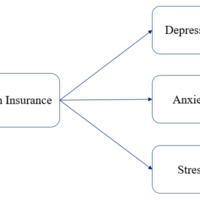Browse Exhibits (2 total)
Elli Cole | Graduate Students’ Health Insurance Needs: The Relationship to Depression, Anxiety, and Perceived Stress

Graduate students frequently report intense stress which contributes to susceptibility to mental health difficulties (Evans et al., 2018; Marks et al., 2011). They are six times more likely to experience depression or anxiety than non-graduate students. Many seek psychological treatment and 50% report considering seeking mental health services (Hyun et al., 2006). However, 46% cite financial constraints as a barrier to receiving services (El-Ghoroury et al., 2012). Currently, there is no research on graduate students’ health insurance, despite potentially being an underinsured population at risk for poor mental health. It was hypothesized that lack of health insurance would predict greater stress, depression, and anxiety in graduate students. Data was collected from graduate students at Ball State University (N = 65), who answered questions about health insurance, depression, anxiety, and stress. The results indicated 21% of students did not have health insurance. A multivariate analysis of variance was used to assess how a lack of health insurance was associated with depression, stress, and anxiety. The results suggested there were significant differences between the groups F3,61 = 334.67, p < .001 and lack of health insurance accounted for 13% of the variance in depression, stress, and anxiety. Discriminant analysis suggested that depression was most strongly associated with differences between groups (.67) followed by stress (.25) and anxiety (.01). The need for health insurance and the mental health of graduate students is discussed.
Faculty Mentor: Anjolii Diaz, Ph.D.
Psychological Science
Graduate
Mariah Bowman | Eliminating Mental Health Stigma on Ball State's Campus

The stigma associated with mental illness describes the shame placed on those experiencing a mental disorder or seeking help for distress. The three types of stigma help spread stereotypes and prejudices to individuals facing these issues, which results in reduced hope, lower self-esteem, and more difficulties with relationships and every-day activities. The community needs to continue focusing on the education of mental illness, as well as provide resources for those experiencing a disorder. By addressing both parties, society becomes more accepting of mental disabilities, which ends in more people openly seeking help without embarrassment.
Faculty Mentor: Gerry Waite
Economics
Undergraduate
Honors College
